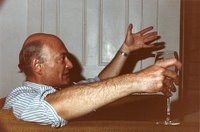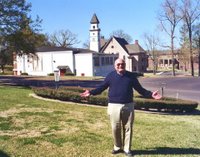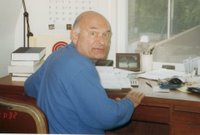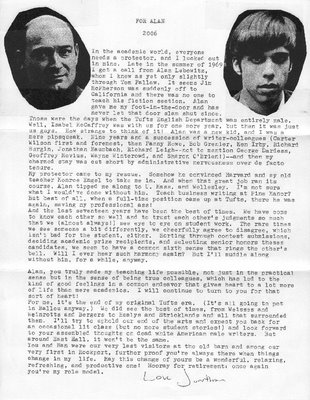Mr. Natural in Medford
 Mr. Natural in Medford
Mr. Natural in Medford My relationship with Alan started without much fanfare in 1976. It was my sophomore year at Tufts and I was a student in his creative writing class. I don’t remember much about the early stages of the first semester other than we students sat around a long conference table and smoked cigarettes while critiquing each other’s stories. For the most part we had that smart ass, know it all, everybody’s full of shit thing going. Alan charted a higher path, presiding over us with bemused humanism.
Everything with Alan changed in a big way around the time I was supposed to present a story to the class. At this point in my college life I was flirting with the idea that I could possibly one day become a fiction writer. I specialized in miniature vignettes that I waited to pour out of me just in time to meet class deadlines. It probably wasn’t Hemingway’s method.
As the big day approached and I performed my writer like rituals, chugging coffee and chain smoking, slumped over my trusty composition book while awaiting inspiration, I was completely flattened by a phone call from back home. A close childhood friend, who only months before had accompanied me to school and made a nice home on my dorm room floor, had recently left to travel the world, “Kerouac style.” Somehow he ended up dead in Thailand. There was no telling exactly what happened but drugs were certainly involved.
The prospect of summoning up any kind of creative energy seemed impossible. There was no way I was going to be able to write a short story. I was a wreck. I became consumed with trying to construct an excuse to present Alan. Somehow telling the truth didn’t seem like an option. I don’t remember how I ended up at Alan’s house. All I remember is that I had prepared an elaborate variation on “the dog ate my homework” that I had carefully rehearsed. I stood unsteadily in his front hallway and launched into my spiel. Alan watched as I started to fall apart. I couldn’t speak. I could barely breathe. I started to cry. I hardly knew Alan and probably hadn’t cried since second grade but there I was.
Of course Alan was wonderful. He got me talking about my friend. He patiently listened and responded with authentic concern. Needless to say, he wasn’t worried about my writing assignment. I left his house feeling that a tremendous burden had been lifted. I also felt that I had made an important friend.
From that point on I took every class I possibly could with Alan. I learned about Hemingway and Mailer. Poe, Melville and Hawthorne. Most of all, I learned about Faulkner and his “little postage stamp of native soil” that was so worth writing and reading about.
We also spent a lot of time together out of class. I remember wonderful conversations about our shared enthusiasm for jazz music and movies. Especially movies. After it became clear that my brilliant future wasn’t going to be found as a fiction writer, I started to imagine myself with a career in film. Alan was always encouraging.
Around this time I started babysitting for Alan’s son Michael. Michael must have been 8 at the time. He was pretty adorable with all sorts of teeth missing, giving him that carved out pumpkin look. I shamelessly exploited Michael by using him in all my student films and broadcasting the fact that I babysat to show the ladies my sensitivity. It wasn’t beneath me to parade Michael in front of girl’s I was courting.
During my years at Tufts, I learned a great deal from Alan about writers working through their central concerns, creating their own worlds that they returned to over and over again. But most importantly Alan opened his world to me. He allowed me to feel like I was part of his family. For all my lone wolf posturing, I have to admit that I was essentially a scared and insecure kid. I’m forever indebted to Alan for teaching me so much and helping me through that time.
Over the years I’ve been able to come back and visit Alan. I’ve gotten to know Nan. It was fantastic to reconnect with Michael and meet Stacey. It has also has meant the world to me that Alan has gotten to meet my kids and wife.
The last time I saw Alan and Nan I was actually taking my son Ethan on that iconic east coast college tour. After a rainy Saturday morning visit to Tufts, we all went to lunch. Alan and Nan were questioning Ethan about which schools he liked. Ethan confessed that he was overwhelmed. Alan gave his characteristic bemused crocked smile and pronounced that once Ethan got to any college he would realize in the words of R Crumb’s philosopher king, Mr. Natural “it don’t mean shit.” Ethan smiled back, comforted. This was clearly wisdom coming from a great man. And it was funny.
Thanks for everything, Alan.



